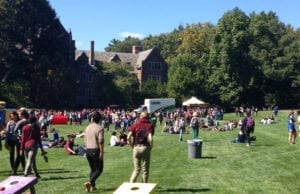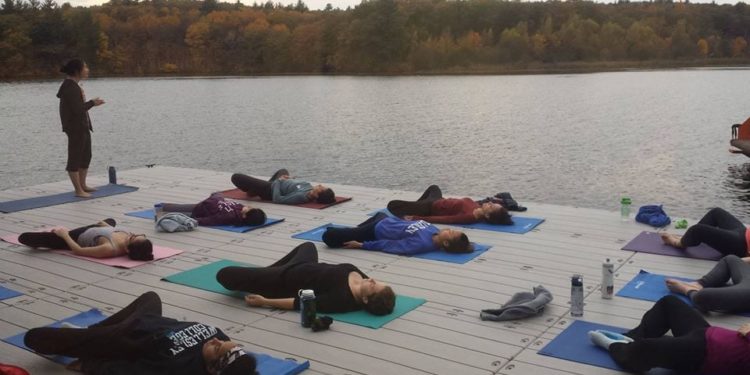In the recreation mission statement at Wellesley College, one of the first activities they promote is living a healthy balanced lifestyle. In order for students to do so, they must be aware of the multiple aspects of wellness. This is where the Campus Wellness Outreach Collaborative comes in.
The collaborative is a group composed of representatives from: Health Services, Physical Education, Recreation and Athletics, Stone Center Counseling Service, Office of Student Involvement, Office of Religious and Spiritual Life, Office of Sustainability, Wellesley Fresh/AVI, and two students from College Government. They meet monthly to discuss overall student wellness.
As a member of the collaborative, Monica Verity, the director of recreation and assistant professor of the practice at Wellesley College, helps to create a welcoming environment that encourages students to engage in the physical aspects of wellness. “I focus on the areas of ‘play’, moving the body, creating community, building confidence, strength and having fun,” said Verity.
From these meetings, the collaborative comes up with special events for the students to help them get involved in other aspects of wellness. One of these events is called Take a Break, described as “a calendar of events on campus to engage students during reading period such as chair massages, dog therapy, moonlight breakfast and spin classes, to name a few activities,” said Verity.
Another wellness event they have is called Lake Day. “It is outside in the fall on an event lawn near our lake where we do yoga, provide flu shots, bug awareness, bouncy house, music and snacks,” said Verity.

Additionally, in the spring the group of campus representatives will collaborate to host a Wellness Festival for students. Verity explains, “this interactive festival promotes the importance of nutrition, exercise, sleep and stress resiliency as the fundamentals to academic and personal success at Wellesley and beyond.”
Being a small school where most of their programs have small budgets and limited staff, Verity stresses the ability to rely on one another to make the most of what they have to be able to put on these special events for students. “Each area does some individual events. For example, recreation will put on an indoor triathlon, but I make sure to coordinate a date that is not going to conflict with a date that student organization is having a large event,” said Verity.
Through these events, the collaborative has found a lot of success in engaging students and helping communicate the message of wellness. One of the ways they are able to ensure they are helping is to provide a self-awareness tool where students answer questions about their strengths and weaknesses in each of the areas of wellness, as well as where they might need more attention.
“We are in the process of making this tool available online and adding campus resources of the areas that need more strength,” said Verity. “For example, if you are weak in your physical wellness the online tool would show you recreation options to group fitness classes, climbing wall hours, boathouse hours or a name for someone to give you a tour of our fitness center.”
Other than physical wellness, Verity highlights mental health and sleep are areas their students need more support in. “We are doing a sleep campaign this spring to help make students aware of healthy habits and the benefits of sleep,” said Verity. “On our campus, bingo is a huge draw for students. We are adding some trivia questions in between rounds about healthy sleep habits and will be giving out sleep masks to the winners.”
For wellness in recreation, Verity adds they have a large number of participants in their group fitness classes, so they make an effort to train students in different programs to diversify their class offerings. “We will be focusing on marketing our diverse fitness schedule but adding how working out improves mood, cognition, sleep and mental health,” she said.
Due to the combined effort of the Campus Wellness Outreach Collaborative at Wellesley College, students are creatively able to be educated on the multiple aspects of wellness. Verity attributes this ability to teamwork. “The biggest message I can give to other recreation directors, no matter the size of the institution, is working with campus partners,” said Verity.
She warns this type of collaboration does take a lot of effort, but making the connections is worth it. “Each area has expertise in their areas that can only help connect students,” she said.










